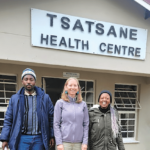… A call for awareness
Ntsoaki Motaung
Twenty-seven-year-old Tanki Phelane is watching his vision deteriorate, making everyday life increasingly challenging.
Born with eyesight problems, Phelane was diagnosed with keratoconus in 2004.
According to the American Academy of Ophthalmology, keratoconus occurs when the cornea thins and bulges into a cone shape. This distortion causes blurry and distorted vision, making tasks like reading and driving difficult.
Phelane shared his story with Newsday, explaining how he had been in and out of hospitals, often with little hope.
“Before I was diagnosed, I would visit health facilities, and they would tell me they didn’t know what was happening. They gave me eye drops to suppress the pain, but it would return once they ran out. After my diagnosis, I was told I needed surgery,” he said.
Doctors informed Phelane that his condition could be treated if addressed early, with surgery being a key part of the treatment plan.
However, the necessary surgery must be performed in South Africa, and since 2018, Phelane has been unable to afford it. The disease has also cost him his job.
“As the disease progressed, I found it harder to work. Some days everything would go blurry, and other days the pain was too unbearable to even leave the house,” he explained.
Eventually, he lost his job due to his worsening condition.
Despite visiting several doctors, including specialists in South Africa, Phelane has been unable to undergo the surgery, which would cost around M50,000.
Without it, he has been told he would lose his sight completely by the time he turned 35.
In his search for help, Phelane reached out to the Ministry of Health, hoping for assistance. While he requested support similar to that provided for other patients, such as those with cancer, he was informed that his condition was not covered under the government’s current agreements with South African hospitals.

“It’s been 10 months since I contacted the Ministry, and nothing has happened,” he said.
Fumane Malebo, General Secretary for the Rare Disease Lesotho Association, explained that rare diseases affect people differently and are often genetic or spontaneous.
“Some rare diseases can be treated, but most cannot. Keratoconus is debated among scientists, some say it is rare, others disagree because more people are affected. If it were classified as a rare disease, our association could help by raising funds,” Malebo said.
Ministry of Health public relations officer, ‘Mateboho Mosebekoa, advised Phelane to continue following up with the office of the Director General of Health Services. Mosebekoa also suggested that he visit Makoanyane Hospital, where an eye specialist could guide him further.
Summary
- The necessary surgery must be performed in South Africa, and since 2018, Phelane has been unable to afford it.
- Without it, he has been told he would lose his sight completely by the time he turned 35.
- While he requested support similar to that provided for other patients, such as those with cancer, he was informed that his condition was not covered under the government’s current agreements with South African hospitals.

Your Trusted Source for News and Insights in Lesotho!
At Newsday Media, we are passionate about delivering accurate, timely, and engaging news and multimedia content to our diverse audience. Founded with the vision of revolutionizing the media landscape in Lesotho, we have grown into a leading hybrid media company that blends traditional journalism with innovative digital platforms.







